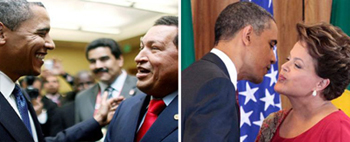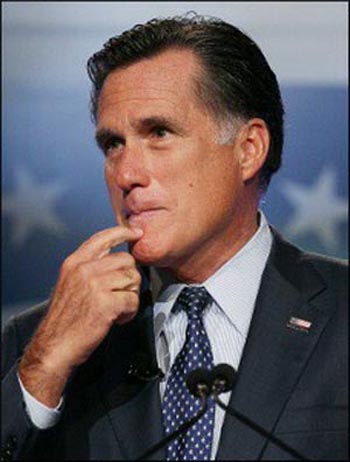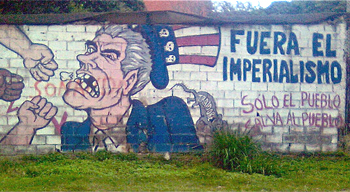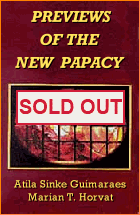International Affairs
 |
 |
 |
 |
 |
 |
 |
The U.S. Elections, Latin America & Cuba
The upcoming U. S. presidential elections on November 5 are a natural point of interest throughout Latin America and the Caribbean, especially the prison-island Cuba, with regard to the foreign policy of the next US government. Because of the natural influence exerted by the United States in the Americas, the future of Latin American politics depend in good measure on the outcome of the next American presidential election.
The prospects are worrying. As for President Obama's policy towards Latin America, one has the impression that the U.S. government has been navigating adrift, aimlessly and without a compass, letting itself be carried away by surface currents, and at times by under-currents that are steadily moving the Latin American Continent in a direction that is leftist and divisive.
 Almost without opposition, the socialist-populism of Chavez in Venezuela has spread to other countries in the region, openly encouraging anti-American feelings. And what has President Obama done to counteract it?
Almost without opposition, the socialist-populism of Chavez in Venezuela has spread to other countries in the region, openly encouraging anti-American feelings. And what has President Obama done to counteract it?
He has only flattered those Latin American presidents who are supposedly "moderate" leftists, presenting them as acceptable alternatives to the more "radical" ones. The most protuberant and disastrous example of Obama's bet on the "useful moderates" had been his support for former Brazilian President Lula, whom he praised in continental forums as a model of a serious statesman and reliable ally.
However, the truth is that the "moderate" socialist President Lula only acted to sabotage the United States and to discourage any reaction against Chavez and Castro in Latin America. Thus, with Obama's complaisance, Lula played the role of a "pseudo-moderate" and paved the way for "radical" anti-American sentiments to take root.
 Lula's successor, President Dilma - another supposed "moderate" socialist - has carried on the same regrettable foreign policy towards Venezuela, Cuba, Bolivia, Ecuador and, more recently, Paraguay. As a result, Obama's government has left the field wide open for the formation of neo-imperialistic regimes with the worst possible orientation in foreign policy.
Lula's successor, President Dilma - another supposed "moderate" socialist - has carried on the same regrettable foreign policy towards Venezuela, Cuba, Bolivia, Ecuador and, more recently, Paraguay. As a result, Obama's government has left the field wide open for the formation of neo-imperialistic regimes with the worst possible orientation in foreign policy.
It must be said, however, that this disastrous American policy towards Latin America and the Caribbean is not just the sad initiative of the Obama government. There has been a chronic lack of aims and political foresight by many American governments, both Democrat and Republican.
For this reason, we harbor no illusions that the Republican candidate might possibly take a better position in relation to Latin America. But let us see in the next weeks the proposals he will present for our region. We honestly hope that these proposals, if any, will be solid, intelligent and feasible. But again, we have no illusions.
In fact, there are influential center and right currents standing for freedom, private property and family values throughout Latin America. The most varied sectors of life - political, economic, educational, journalistic, institutional, etc. - are represented by these currents.
In view of this, it would be quite easy for an American presidential candidate to draw up a plan of action with the paramount goal of strengthening cultural and diplomatic links with these center and right Latin American currents, the natural allies of similar currents presently emerging with remarkable strength in the United States.
 Why has no American government up to now adopted policies as simple as these? This question is relevant, for such policies would stem the tide - even if only indirectly - of the "radical" pro-Chavez and pro-Castro elements in Latin America. At the same time, they would deservedly demoralize their most efficient allies, the "useful moderates."
Why has no American government up to now adopted policies as simple as these? This question is relevant, for such policies would stem the tide - even if only indirectly - of the "radical" pro-Chavez and pro-Castro elements in Latin America. At the same time, they would deservedly demoralize their most efficient allies, the "useful moderates."
This omission of the U.S. government in its policy towards Latin America is a mystery. So, what is the purpose of raising this topic here? What is the goal of these respectful suggestions to advance the ties between the best and healthiest forces of the United States and Latin America?
Our modest goal is simply to encourage the appropriate fulfillment of these aspirations, namely, the establishing of cultural links between sectors of the center and right in the United States and Latin America that could play a decisive role in veering the Latin American countries away from the unhealthy socialist agenda currently prevailing in the region. (To read the original in Spanish here.)

Posted September 19, 2012
The prospects are worrying. As for President Obama's policy towards Latin America, one has the impression that the U.S. government has been navigating adrift, aimlessly and without a compass, letting itself be carried away by surface currents, and at times by under-currents that are steadily moving the Latin American Continent in a direction that is leftist and divisive.

Obama's policy is friendship with the socialist Latin American presidents; above, with Chavez and Dilma
He has only flattered those Latin American presidents who are supposedly "moderate" leftists, presenting them as acceptable alternatives to the more "radical" ones. The most protuberant and disastrous example of Obama's bet on the "useful moderates" had been his support for former Brazilian President Lula, whom he praised in continental forums as a model of a serious statesman and reliable ally.
However, the truth is that the "moderate" socialist President Lula only acted to sabotage the United States and to discourage any reaction against Chavez and Castro in Latin America. Thus, with Obama's complaisance, Lula played the role of a "pseudo-moderate" and paved the way for "radical" anti-American sentiments to take root.

Will the Republican platform of Romney take a better stance toward Latin America?
It must be said, however, that this disastrous American policy towards Latin America and the Caribbean is not just the sad initiative of the Obama government. There has been a chronic lack of aims and political foresight by many American governments, both Democrat and Republican.
For this reason, we harbor no illusions that the Republican candidate might possibly take a better position in relation to Latin America. But let us see in the next weeks the proposals he will present for our region. We honestly hope that these proposals, if any, will be solid, intelligent and feasible. But again, we have no illusions.
In fact, there are influential center and right currents standing for freedom, private property and family values throughout Latin America. The most varied sectors of life - political, economic, educational, journalistic, institutional, etc. - are represented by these currents.
In view of this, it would be quite easy for an American presidential candidate to draw up a plan of action with the paramount goal of strengthening cultural and diplomatic links with these center and right Latin American currents, the natural allies of similar currents presently emerging with remarkable strength in the United States.

Anti-American signs accusing us of "imperialism" are common in the streets of Caracas, Venezuela
This omission of the U.S. government in its policy towards Latin America is a mystery. So, what is the purpose of raising this topic here? What is the goal of these respectful suggestions to advance the ties between the best and healthiest forces of the United States and Latin America?
Our modest goal is simply to encourage the appropriate fulfillment of these aspirations, namely, the establishing of cultural links between sectors of the center and right in the United States and Latin America that could play a decisive role in veering the Latin American countries away from the unhealthy socialist agenda currently prevailing in the region. (To read the original in Spanish here.)

Posted September 19, 2012
Destaque Internacional
n. 363 - August 27, 2012
______________________
______________________











